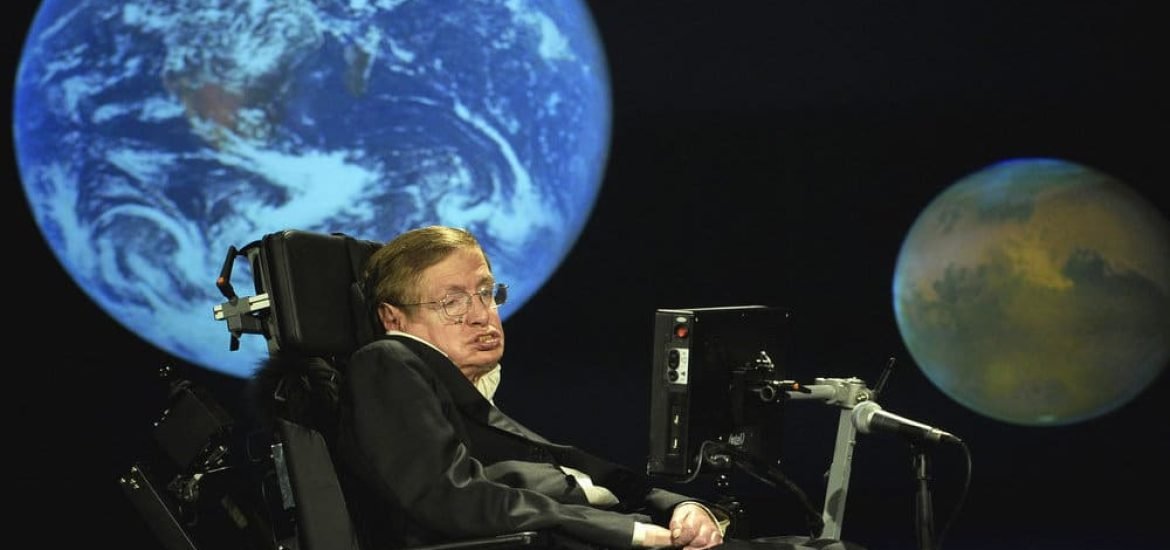
At a time when science is increasingly challenged by pressure groups who would like to impose other paradigms on humanity, the death of Stephen Hawking is an opportunity for reflection, but also to raise questions on the future of science.
Like every great man, his life was multi-faceted and paradoxical. On the one hand, there was the theoretical physicist and cosmologist hailed by his peers. In the quest for the Theory of Everything, he sought to unite relativity and quantum physics. His main work with Roger Penrose focused on the singularity and the discovery of Hawking radiation. On the other hand, there was the famous man himself. The author of one of the greatest bestsellers A Brief History of Time . And finally, the popular icon and Hollywood star – he appeared in Star Trek, Big Bang Theory, had his own character in the Simpsons and was the subject of the Oscar-winning film The Theory of Everything Over the years, Hawking had become a larger than life character.
Hawking sought in his work to unify the infinitely large and the infinitely small … he managed to bring together in his own persona infinite esotericism and immense popularity. In fact, he devoted a large part of his life to the popularisation of science.
One may well wonder if the paradox that he incarnated is a useful metaphor for science today. Science has never been more powerful and capable of modelling and explaining the creation and constitution of our universe. Equally it has never been so heckled and criticised, by an audience which has doubts not only about its omnipotence but also of its ability to tell the truth.
This paradox is found elsewhere on social networks. Many scientists accuse social networks of spreading “Fake News” (claiming that the earth is flat, questioning evolution …). And yet, on Hawking’s death internet users were busily tapping into the meme pool of his quotes. This proves that the self-same social networks can be a fantastic ally of popular science. It’s an opportunity to enjoy some of Hawking’s quotes – the best-known being “Remember to look up at the stars and not down at your feet. Try to make sense of what you see and wonder about what makes the universe exist. Be curious. And however difficult life may seem, there is always something you can do, and succeed at. It matters that you don’t just give up.”
Hawking on the existence of the Universe “If we find the answer to that, it would be the ultimate triumph of human reason – for then we would know the mind of God”;
On God “It is not necessary to invoke God to light the blue touch paper and set the universe going”;
Or finally “My goal is simple. It is a complete understanding of the universe, why it is as it is and why it exists at all”.
Of course these are the popular sound-bites. But they show that the wisdom of a great scientist is accepted and prized by the public who have no trouble acknowledging it. But at the same time any doctor who dares to defend vaccination will be jeered at and become the target of angry tweets.
While scientists have considerable difficulty communicating with the media and often find their statements distorted and their reasoning questioned, it turned out that Stephen Hawking could, and did, speak out on any subject.
Also, and this is probably another angle on the complexity of his life, in recent years he had not hesitated to issue warnings about the possibility of overly rapid developments in science and especially Artificial Intelligence, even going so far as to assert that “Artificial Intelligence will be either the best, or the worst thing ever to happen to humanity” We should note in passing that having devoted his scientific research to the study of singularities in the field of astrophysics, he tended to also believe in the likely advent of AI from an eschatological point of view, since he even declared that “We can not predict what we might achieve when our own minds are amplified by AI. Perhaps with the tools of this new technological revolution, we will be able to undo some of the damage done to the natural world by the last one – industrialisation. And surely we will aim to finally eradicate disease and poverty. Every aspect of our lives will be transformed. In short, success in creating AI could be the biggest event in the history of our civilization”
What lessons can we draw from Hawking’s life? His example shows us that science remains popular. Of course there is something of a gloss for this: Hawking sought to understand the universe, not to modify it; then the fact that he dealt mainly with esoteric matters gave him a kind of aura and made him an icon – “he understands things that we are unable to understand”. Added to this was a touch of humour and self-mockery that showed the extraordinary strength of character of the most famous sufferer of amyotrophic lateral sclerosis…. But in spite of all these considerations, through the devotion we felt to this most unusual character, we can see that humanity, deep down inside, continues to trust in rationality and maintains its faith in the virtues of science.
This post is also available in: FR (FR)